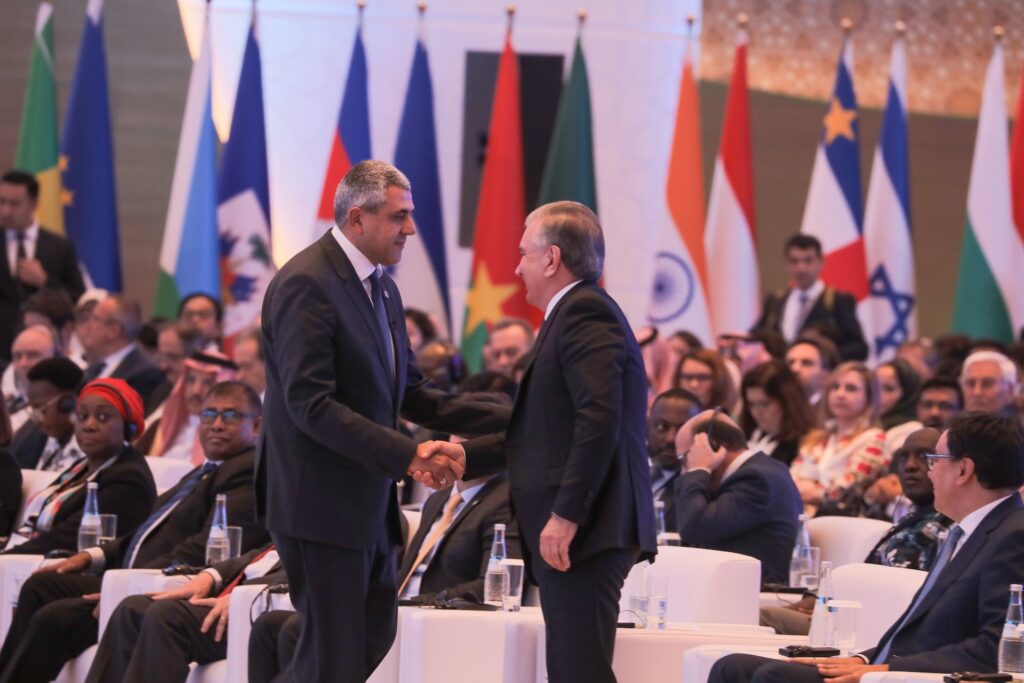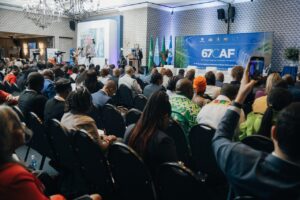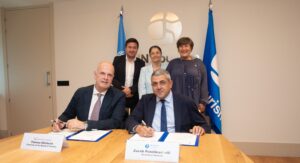The 25th session of the UNWTO General Assembly opened with UNWTO Secretary-General Zurab Pololikashvili commending Uzbekistan’s remarkable achievements in the tourism sector.
In his opening remarks, Mr. Pololikashvili conveyed his admiration for Uzbekistan, describing it as a place close to his heart. He praised the country for its warm hospitality, cooperative spirit, and the enchanting city of Samarkand, often referred to as a wonder.
He stated, “Uzbekistan is a land of smiles, of friendship, and cooperation,” stressing the significance of Samarkand in the hearts of those who visit. Mr. Pololikashvili praised the city’s capacity to surprise even repeat visitors.
The Secretary-General acknowledged the demanding week ahead and highlighted the importance of building relationships among the assembly’s attendees. He expressed his deep honour in being joined by the President of Uzbekistan, Shavkat Mirziyoyev, who displayed unwavering support for the assembly’s work.
Mr. Pololikashvili applauded President Mirziyoyev’s commitment to tourism and emphasised that “tourism must be state policy, not led from the sidelines but at the very top.”
Regarding Uzbekistan’s attractiveness as a tourist destination, Mr. Pololikashvili revealed that the country welcomed over five million international visitors last year, achieving 80% of pre-pandemic levels. He attributed this success to Uzbekistan’s substantial improvements in visa facilitation and travel infrastructure.
The Secretary-General highlighted Uzbekistan’s youthful population, with 25% of Uzbeks being under the age of 14. He commended the country’s leadership for recognizing the potential of its young population and underscored the importance of supporting and empowering young people in the tourism sector.
He announced the establishment of the Samarkand Academy in collaboration with UNWTO, which aims to support youth in tourism education and professional development. Furthermore, a new UNWTO Thematic Office focusing on Tourism and the Silk Road was established to harness the potential of this historical trade route for tourism.
Mr. Pololikashvili celebrated Uzbekistan’s inclusive approach to tourism, highlighting that tourism has become a shared asset. The people of Uzbekistan are increasingly recognizing the sector’s importance, with tourism contributing to job creation, business growth, and more.
Regarding investments, the Secretary-General praised Uzbekistan’s commitment to attracting foreign investment, especially in green energy projects like solar and wind power. These initiatives align with the principles of sustainability, which is a key focus for UNWTO.
The Secretary-General acknowledged the unique setting of Samarkand, a place where heritage thrives, and cultural traditions are celebrated and preserved. He expressed confidence that the assembly would leave with not only cherished memories, but also firm plans to replicate Samarkand’s success in promoting cultural tourism and gastronomy tourism worldwide.
“These exceptional strides not only boost the nation’s economy, but also promote cultural exchange and understanding on a global scale. Uzbekistan’s rich history and diverse attractions make it an inspiration for other nations,” he posited.
Pololikashvili also articulated the importance of building multiple pillars to strengthen tourism’s foundations, inviting tourists to experience not only history, but also food, wine, landscapes, and the modernity of destinations.
The Secretary-General expressed his gratitude for the unique stage provided by Uzbekistan and Samarkand, a city that has historically been a crossroads for cultures and trade. He affirmed the assembly’s commitment to advancing tourism for the benefit of everyone while recognising Samarkand’s pivotal role in laying the foundations for change.
The 25th UNWTO General Assembly promises to be a significant event that showcases Uzbekistan’s dedication to tourism and its potential to inspire change in the global tourism industry.
The Assembly’s discussions will include the Samarkand Declaration, focusing on preserving traditions and promoting cultural tourism as a pillar of growth and opportunity. It is also an opportunity to explore the growth of gastronomy and wine tourism, reflecting the diverse and dynamic nature of tourism in the modern world.
As the Assembly progresses, it is expected to lead to innovative approaches and policies that will help shape the future of tourism globally. Samarkand’s rich history and its modernity as a bustling tourist destination will undoubtedly leave a lasting impression on the delegates as they work towards advancing the tourism sector.








